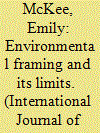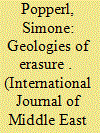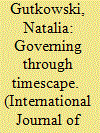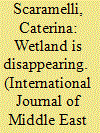|
|
|
Sort Order |
|
|
|
Items / Page
|
|
|
|
|
|
|
| Srl | Item |
| 1 |
ID:
161163


|
|
|
|
|
| Summary/Abstract |
From arid cities to irrigated fields, hot deserts to Mediterranean mountains, costal enclaves to verdant oases, the Middle East and North Africa (MENA) encompasses a range of environments for thinking through the relationships between nature and society, people, plants, and animals, human and nonhuman worlds. Early depictions of the region in terms of patriarchal, tradition-bound, and largely homogenous Muslim populations living in undifferentiated desert spaces has long given way to scholarship that identifies the diversity and dynamism of associational life, political subjectivities, state formations, religious practices, and gender performances. Only relatively recently, however, has a significant subset of scholarship on the Middle East and North Africa picked up newer approaches to environmental issues and taken a renewed look at older topics, such as the relationship between water and the state and local subsistence practices in arid lands. This shift in the scholarship is not necessarily a reflection of rising popular “environmental consciousness” in the Middle East and North Africa, although people of the region have always been living in and thinking about the material worlds around them. For while there have been recent efforts to connect local traditions to global environmental discourses, such as rereading religious texts for their “green” character and celebrating heat-shedding architectural design, “the environment” as a term has a more uneven resonance regionally than it does in some other parts of the world. Rather, this increasing scholarly interest stems from a growing recognition within the euromerican academy of the environment as comprising intertwined social, material, political, biological, and representational worlds, and thus constituting an important focus of study.
|
|
|
|
|
|
|
|
|
|
|
|
|
|
|
|
| 2 |
ID:
161167


|
|
|
|
|
| Summary/Abstract |
As activists frame campaigns, their region's broader cultural and political context intercedes. In Israel and Palestine attempts to work across national lines and undertake activism that links ecological, economic, and social issues have long been stymied. This article examines how the fraught historical and contemporary relationships of Israelis and Palestinians with land bestow both flexibility and limitations on their framing of campaigns. In particular, it ethnographically analyzes the framing of two projects—the building of an “eco-mosque” and a Jordan River restoration effort—to examine how activists grapple with frame flexibility and its limits. It finds that an Israeli tendency to deterritorialize environmental issues and curb environmental campaigns that are “too political” conflicts with Palestinian criticism of apolitical frames because they euphemize violence and domination. These cases demonstrate how local connotations can make or break environmental campaigns. The eco-adage, “Think global, act local” is not enough. One must think local, too.
|
|
|
|
|
|
|
|
|
|
|
|
|
|
|
|
| 3 |
ID:
161166


|
|
|
|
|
| Summary/Abstract |
Scientists who study Dead Sea sinkholes come to know them in particular ways (as generalized hydrogeoloic phenomena, symptoms of a regional environmental crisis, or divine retribution) and at particular scales (from the distant orbit of Earth observation satellites, from digitally altered aerial photographs, and occasionally from the inside). Using ethnographic data gathered between 2012 and 2015 in the occupied Palestinian territories (oPt), Israel, and Jordan, I compare how groups and individuals study, think, and learn about Dead Sea sinkholes. The way hydrogeologic knowledge about these sinkholes is gathered and circulated helps define land around the Dead Sea as territory to be colonized. These scientific processes can nullify Palestinian claims to the Dead Sea, eliminate Palestinian people from Dead Sea landscapes, and marginalize Bedouin opposition to Jordanian government policies. I suggest that attention to “geologies of erasure” helps scholars to understand the scientific and political impacts of settler colonialisms on the collection of knowledge about changing natural environments in the Middle East and beyond.
|
|
|
|
|
|
|
|
|
|
|
|
|
|
|
|
| 4 |
ID:
161168


|
|
|
|
|
| Summary/Abstract |
Social scientists commonly know that time is a social construct and a tool for governing by those holding power. Yet, how exactly is time used for governing? This article examines how timescape (embodiment of approaches to time) works in practice as a tool of power by considering multiple networks of time that manifest in al-Batuf/Beit Netofa Valley planning policy. This valley's agriculture, mostly owned by Palestinian-Arab citizens of Israel, is considered by ecologists and officials a unique traditional agriculture landscape and wetland habitat that has become scarce in Israel due to its development and wetland drainage. Assembling separate modes of anthropological inquiry that attend to time as a technique, I show that knowledge, ethics, and time management are not separate spheres of governance but rather interwoven as one timescape tool of governing. Thus, the case of al-Batuf/Beit Netofa elucidates the ways in which time is used for governing in the context of an agricultural-environmental development policy and plan.
|
|
|
|
|
|
|
|
|
|
|
|
|
|
|
|
| 5 |
ID:
161169


|
|
|
|
|
| Summary/Abstract |
This article analyzes Turkish forestry as a site of nation building. To understand the ways in which forestry shaped ideas of the state and citizenship, I explore the history and memories of the forestry enterprise, Zingal, from the early 20th century to the present. I argue that the conflicting narratives around Zingal in archives and memory are symptoms of the contradictions inherent to nationalist modernity. I also reveal the continuation of similar contradictions in the 21st century by showing how citizens’ discourse of resentment over deindustrialization can coexist with their objection to a potential nuclear industry.
|
|
|
|
|
|
|
|
|
|
|
|
|
|
|
|
| 6 |
ID:
161164


|
|
|
|
|
| Summary/Abstract |
Recent Palestinian Authority (PA) initiatives to help Palestine adapt to climate change help shine light on the role that climate uncertainties play in how political futures can be represented. UN-led adaptation has occasioned opportunities for new networks of actors to make claims about Palestinian futures and to perform PA readiness for statehood. These actors weigh scientific uncertainties about climate against uncertainties over if and when settler colonialism in Palestine will end. How they do so matters because it is the foundation of requests for capital that could be translated into some of the most important institutions and infrastructures of Palestinian governance over the next several years, including those that provide Palestinians with access to water. It also matters because it constitutes the image with which PA officials represent what needs to be “fixed” in Palestine in important international forums such as the UN. Climate change adaptation is a new approach to the management of uncertain environmental futures. This analysis offers insight into how this approach shapes and is shaped by practices of statecraft in places marked by the volatilities of war, economic crisis, and occupation.
|
|
|
|
|
|
|
|
|
|
|
|
|
|
|
|
| 7 |
ID:
161165


|
|
|
|
|
| Summary/Abstract |
This article analyzes the transformation of the Kızılırmak Delta on the Black Sea coast of Turkey into a Turkish wetland. This production involved the transformation of international categories of wetlands into national imaginaries, as well as the material remaking of landscapes themselves. Population and agro-economic shifts concurrent to the formation of the Turkish nation-state transformed the delta into an agricultural landscape, and subsequently into a contested conservation area whose use is informed by changing Turkish and international notions of wetlands. I focus on the situated, local processes and practices through which wetlands are produced and become relevant to different social groups as subjects of scientific knowledge and environmental imaginations. These, I argue, have rendered the wetland an open-air laboratory and an object of care for environmental advocates, scientists, and residents.
|
|
|
|
|
|
|
|
|
|
|
|
|
|
|
|
|
|
|
|
|